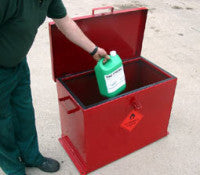Petrol Carriage & Storage – have you got it right?
Petrol Carriage & Storage - have you got it right?

Petrol is a highly flammable liquid and, because it can emit flammable vapour even at low temperatures, should be treated with respect! There is always the risk of fire or explosion if it is close to a source of ignition.
The storage and carriage of petrol is a concern for us all and the risks involved should be assessed. Many greenkeepers and groundsmen are often, unwittingly, breaking the law and risking prosecution by storing and collecting petrol from local garages in unauthorised containers and/or in too great a quantity.
It is very difficult to obtain clear advice on the storage and carriage of petrol as it applies to greenkeeping and grounds maintenance, as there are a number of different pieces of relevant legislation. On storage alone there is:
-
The Petrol (Consolidation) Act 1928 (PCA),
-
The Petroleum-Spirit (Motor Vehicles etc.) Regulations 1929
-
The Petroleum-Spirit (Plastic Containers) Regulations 1982.
To make matters more difficult, local fire authorities and other official agencies often interpret regulations in different ways and insist on special arrangements for your particular conditions. An example is that, although The Petroleum-Spirit (Motor Vehicles etc.) Regulations 1929, allows up to 275 litres of petrol to be kept in any one storage place without a licence, this can be considerably reduced, particularly if there are perceived hazards. (and this is often the case!) The amount of fuel stored in the fuel tanks of all vehicles is included in the total allowed to be stored. An acceptable amount of petrol, in purpose designed storage, at greenkeeping / turf maintenance premises in "normal" circumstances, would probably be below 100 litres (not including that in vehicle tanks).
Plastic containers can be used as well as metal (The Petroleum-Spirit (Plastic Containers) Regulations 1982). For storage in plastic containers without a licence, the containers must;
-
Be constructed of suitable materials
-
Have a maximum capacity of 5 litres
-
Be designed and constructed properly
-
Have appropriate markings or labels
And the quantities that can be stored are;
-
2 x 5 litre containers on any motor vehicle
-
plus 2 further containers in a safe place
-
plus 2 more containers in another safe place at least 6 metres from the the first
These quantities are in addition to any petrol kept in metal containers.
All this can lead to confusion to say the least, so what should a responsible club / organisation do?
The following advice is offered;
-
Do not allow staff to collect petrol from local garages in anything other than 2 x 5 litre purpose designed containers, unless they are taking a special Transit Box, which can hold 4 x 20 litre jerrycans and should be carried in the back of a pick-up or on a trailer.
-
Ensure that you store as little petrol as possible on site in a specially designed and approved container. It is far better to make regular collections. Should you need to store vast quantities of petrol then you should consider installing a special above ground tank such as the Supervault MH.
-
Place a suitable fire extinguisher adjacent to every petrol storage and refuelling area.
-
Place an appropriate spill kit in the same areas. The best spill kits are those produced from sphagnum moss, such as Cansorb, that will reduce the level of harmful vapours from 100% to 10% immediately and are "oil only".
-
Place conspicuous notices - "Petroleum Spirit", "Highly Inflammable", "No Smoking" and "Switch Off Engine" - in the above areas.
-
Always use a funnel or dispensing spout for refuelling and in a well-ventilated area.
-
Staff should be protected from splashes and spills. Gloves should be worn and, ideally, goggles.
-
Clean up any spillage immediately, using a spill kit and dispose of all petrol soaked product safely.
-
Keep ignition sources - cigarettes, hand lamps, heaters, welding apparatus etc. - away from petrol.
Special transit boxes are not expensive and really are a must if you or your staff are transporting petrol in excess of the legal amount of 2 x 5 litre containers. They are probably the most cost effective way of complying with the regulations. Course Care is one company that supply these nationally, together with petrol storage, spill kits, fire extinguishers, protective clothing, jerrycans and they offer free advice!
Contact: Course Care 0845 600 3572, Email: info@highspeed.co.uk
